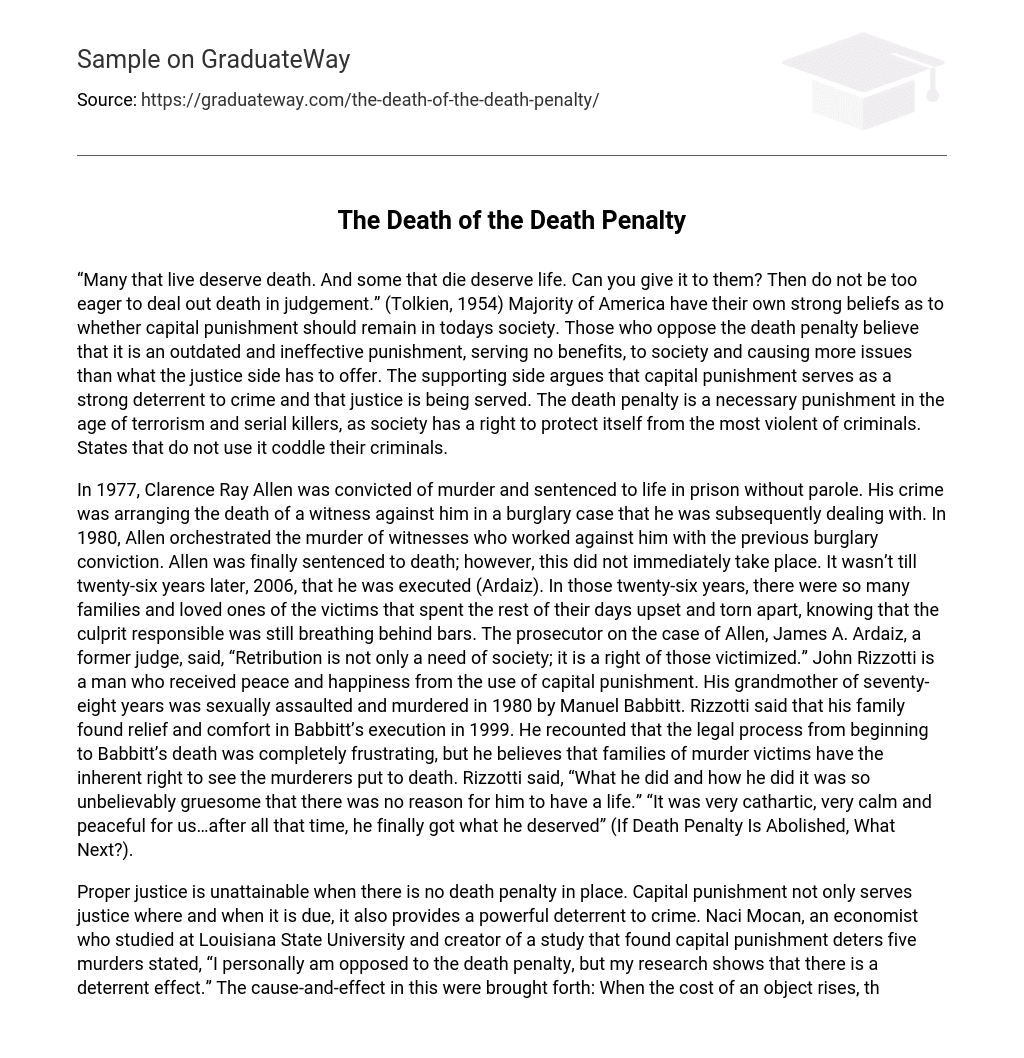“Many that live deserve death. And some that die deserve life. Can you give it to them? Then do not be too eager to deal out death in judgement.” (Tolkien, 1954) Majority of America have their own strong beliefs as to whether capital punishment should remain in todays society. Those who oppose the death penalty believe that it is an outdated and ineffective punishment, serving no benefits, to society and causing more issues than what the justice side has to offer. The supporting side argues that capital punishment serves as a strong deterrent to crime and that justice is being served. The death penalty is a necessary punishment in the age of terrorism and serial killers, as society has a right to protect itself from the most violent of criminals. States that do not use it coddle their criminals.
In 1977, Clarence Ray Allen was convicted of murder and sentenced to life in prison without parole. His crime was arranging the death of a witness against him in a burglary case that he was subsequently dealing with. In 1980, Allen orchestrated the murder of witnesses who worked against him with the previous burglary conviction. Allen was finally sentenced to death; however, this did not immediately take place. It wasn’t till twenty-six years later, 2006, that he was executed (Ardaiz). In those twenty-six years, there were so many families and loved ones of the victims that spent the rest of their days upset and torn apart, knowing that the culprit responsible was still breathing behind bars. The prosecutor on the case of Allen, James A. Ardaiz, a former judge, said, “Retribution is not only a need of society; it is a right of those victimized.” John Rizzotti is a man who received peace and happiness from the use of capital punishment. His grandmother of seventy-eight years was sexually assaulted and murdered in 1980 by Manuel Babbitt. Rizzotti said that his family found relief and comfort in Babbitt’s execution in 1999. He recounted that the legal process from beginning to Babbitt’s death was completely frustrating, but he believes that families of murder victims have the inherent right to see the murderers put to death. Rizzotti said, “What he did and how he did it was so unbelievably gruesome that there was no reason for him to have a life.” “It was very cathartic, very calm and peaceful for us…after all that time, he finally got what he deserved” (If Death Penalty Is Abolished, What Next?).
Proper justice is unattainable when there is no death penalty in place. Capital punishment not only serves justice where and when it is due, it also provides a powerful deterrent to crime. Naci Mocan, an economist who studied at Louisiana State University and creator of a study that found capital punishment deters five murders stated, “I personally am opposed to the death penalty, but my research shows that there is a deterrent effect.” The cause-and-effect in this were brought forth: When the cost of an object rises, the number of objects bought will decline drastically (Liptak). Most murderers have premeditated plans when it comes to committing the act and that planning will hopefully provide the pros and cons, weighing out the worth of the crime. Any type of discipline or penalty will have some sort of deterrent effect, but a more drastic penalty will lead to a stronger discouragement from crime (Ardaiz). Saving lives a preventing murder is one of America’s best interests. Because of this, the U.S. is obligated to use the most severe punishment to deter murder (Arguments for and Against the Death Penalty).
The opposing side argues that when a person is executed for a crime that deserves the maximum penalty America has to offer, there might be a slight chance of an innocent person receiving the punishment for someone else’s wrong doings. There is always going to be a factor of human error or bias (First, Abolish the Death Penalty). One example of this is, on September 21, 2011, Troy Davis was executed for shooting a police officer who was attempting to resolve a fight in a parking lot in Georgia. There was clear evidence during the case that there was police misconduct which brought controversy. There were 630,000 letters begging for a stay of execution and multiple witnesses who claimed that the police threatened them if they chose not to cooperate and identify Davis as the murderer. The whole affair was viewed as a failure for the state of Georgia (Severson). However, it is worse to allow a guilty murderer to live in prison, where they can conduct premeditated attacks from the inside of bars and have others carry out their execution on the outside. All a person must do is see the facts of how every executed criminal result in one or two saved lives. The choice would become obvious at that point form a moral and logical point of view. With this, there is no proof in any which, way, shape or form that any innocent person has been executed since the death penalty system utilized was revised in the 1970’s. America has a meticulous system of appeals through numerous courts, it’s almost impossible for an innocent person to be executed. In time, there will be flaws within the system and reforms will be made. However, there is no need to put an end to capital punishment.
Most people that have been released from death row only became free due to legal technicalities. If someone can be proven innocent, then they will obtain clemency. Theoretically, if an execution resulted in the death of an innocent life, the death can be defended because capital punishment saves life though deterrence (Arguments For and Against the Death Penalty).





